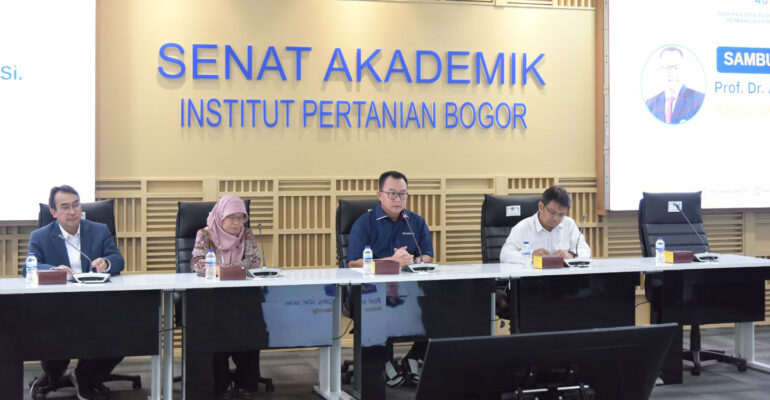Spatial Experts Talk about Urban Planning and Development at IPB University, This is What Rector Says

Spatial experts from various universities, ministries, and local governments gathered to discuss urban planning and development at IPB University, 17/10. This activity was packaged in The 46th Strategic Talks, “Spatial Dynamics and Urban Planning and Development in Indonesia”.
The experts present came from IPB University, Bandung Institute of Technology, Gajah Mada University, Sepuluh Nopember Institute of Technology, Padjadjaran University, Indonesian Landscape Architects Association (IALI), Indonesian Institute of Public Accountants, Acting Bogor Mayor, Acting Bogor Regent, Ministry of Agrarian and Spatial Planning/National Land Agency (ATR/BPN), and Ministry of Public Works and Housing (PUPR).
Rector of IPB University, Prof Arif Satria on that occasion said that urban planning and development are vital aspects that must be considered by all parties. According to him, the parties must really think about how the planning is like.
“We have to learn from China which is very good with its long-term planning. In Indonesia, planning is done after the political system occurs and will only enter the five-year planning,” said Prof Arif.
The Rector of IPB University highlighted the vulnerability of planning and development that occurs today which depends on regional autonomy. He mentioned in the research of IPB University experts, the impact of regional autonomy tends to be more exploitation than management. According to him, the regions do not have a good planning vision so that regional development is not sustainable with planning from the centre.
The Rector strongly supports the experts gathered to conduct studies, including related to planning and development with aspects studied on the evaluation of regional autonomy that has been running for 25 years.
Not only that, Prof Arif Satria also highlighted the persistence of exploitation under the law. Call it the law on the protection of sustainable agriculture. In the law, land conversion is limited to 20 per cent, so what happens is that the law is a “tool” to convert, even though the spirit is to protect.
“Another example is the desire to save agricultural land around the IPB University Campus and it turns out that the agricultural land is intended for residential land,” said Prof Arif Satria.
Also present was Reni Widyawati, Acting Secretary of the Directorate General of Spatial Planning of the Ministry of Agrarian Affairs and Spatial Planning / National Land Agency (ATR / BPN). She said that this talk show can give positive results and can provide input for the next cabinet.
Reni mentioned that in the spatial plan, there will be cities for new growth centres to reduce the gap between Java and outside Java. This includes the Capital City of the Archipelago (IKN) which is part of a new growth centre that will become a national strategic area.
Meanwhile, Pandu Gunadi Atmosukarto, Director of Water Resources Management Systems and Strategies of the Ministry of PUPR conveyed several challenges of urban development in Indonesia. Some of them are related to the availability of basic services. According to him, the most likely condition for Indonesia today shows that drinking water, sanitation, and waste services are still not widely available.
“Data from the Central Statistics Agency (BPS) shows that by 2023, the proportion of households with access to safe drinking water will be around 9.1 per cent. In addition, most cities in Indonesia are located in coastal areas, making them vulnerable to various disasters such as sea level rise and an increase in the intensity of geological disasters,” said Pandu Gunadi.
Not only that, he said, cities in Indonesia also experience vulnerability to disasters. Therefore, disaster resilience is important in the implementation of development planning.
“I hope that the partnerships and synergies present at this event can continue to be enhanced in order to answer the challenges of urban development in the future. The creation of complementary knowledge, experience and resources is expected to result in more effective and sustainable decisions,” said Pandu Gunadi.
He emphasised that the future depends on our ability to plan and design urban spaces. “Therefore, I hope this activity will trigger discussions and get innovative ideas in improving the quality of planning,” he concluded. (dh/ra) (IAAS/RSL)



